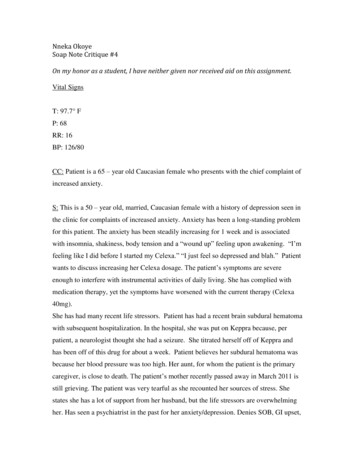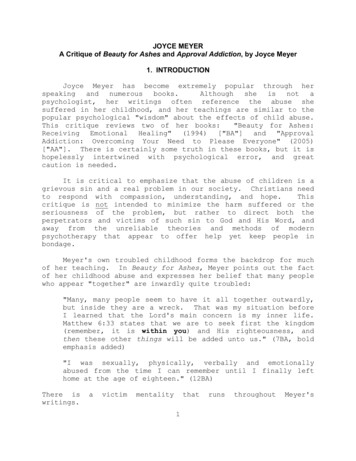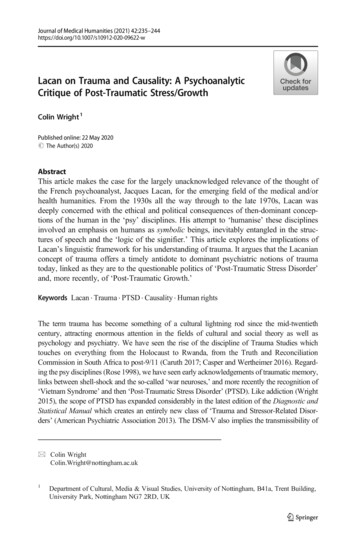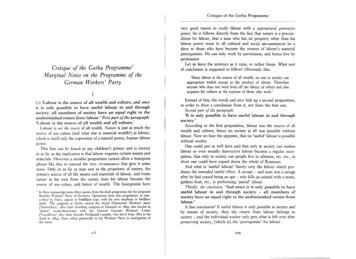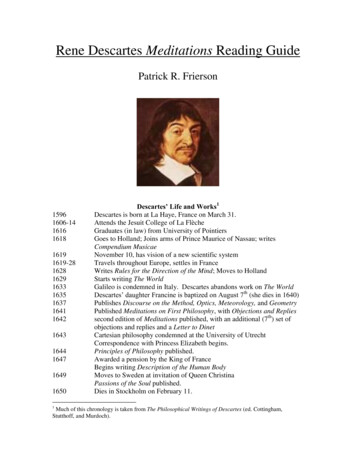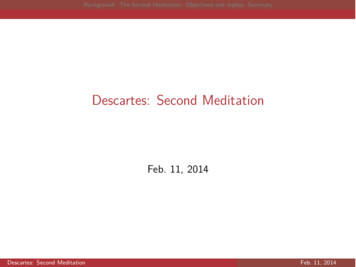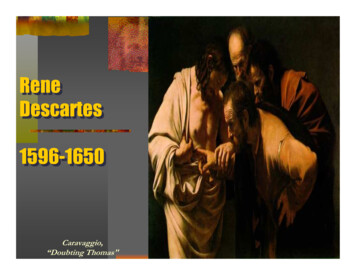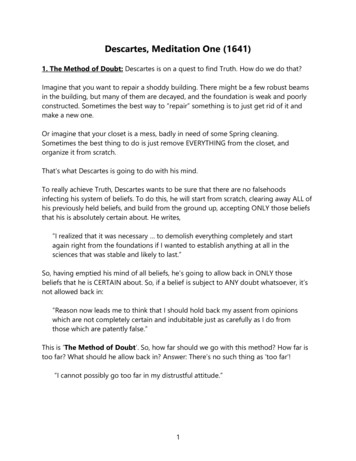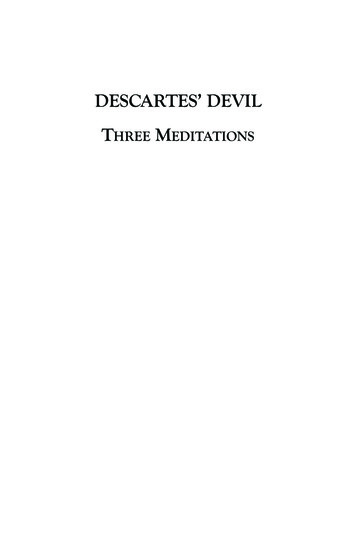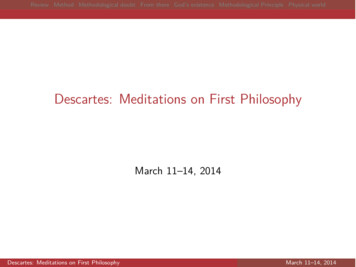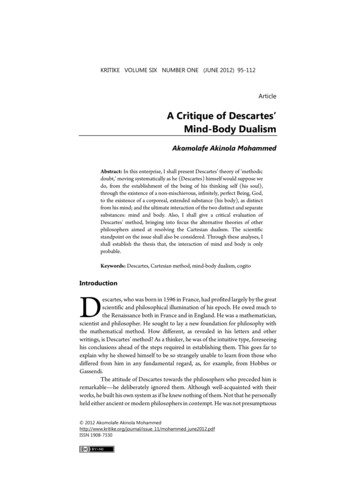
Transcription
KRITIKE VOLUME SIX NUMBER ONE (JUNE 2012) 95-112ArticleA Critique of Descartes’Mind-Body DualismAkomolafe Akinola MohammedAbstract: In this enterprise, I shall present Descartes’ theory of ‘methodicdoubt,’ moving systematically as he (Descartes) himself would suppose wedo, from the establishment of the being of his thinking self (his soul),through the existence of a non-mischievous, infinitely, perfect Being, God,to the existence of a corporeal, extended substance (his body), as distinctfrom his mind; and the ultimate interaction of the two distinct and separatesubstances: mind and body. Also, I shall give a critical evaluation ofDescartes’ method, bringing into focus the alternative theories of otherphilosophers aimed at resolving the Cartesian dualism. The scientificstandpoint on the issue shall also be considered. Through these analyses, Ishall establish the thesis that, the interaction of mind and body is onlyprobable.Keywords: Descartes, Cartesian method, mind-body dualism, cogitoIntroductionDescartes, who was born in 1596 in France, had profited largely by the greatscientific and philosophical illumination of his epoch. He owed much tothe Renaissance both in France and in England. He was a mathematician,scientist and philosopher. He sought to lay a new foundation for philosophy withthe mathematical method. How different, as revealed in his letters and otherwritings, is Descartes’ method? As a thinker, he was of the intuitive type, foreseeinghis conclusions ahead of the steps required in establishing them. This goes far toexplain why he showed himself to be so strangely unable to learn from those whodiffered from him in any fundamental regard, as, for example, from Hobbes orGassendi.The attitude of Descartes towards the philosophers who preceded him isremarkable—he deliberately ignored them. Although well-acquainted with theirworks, he built his own system as if he knew nothing of them. Not that he personallyheld either ancient or modern philosophers in contempt. He was not presumptuous 2012 Akomolafe Akinola Mohammedhttp://www.kritike.org/journal/issue 11/mohammed june2012.pdfISSN 1908-7330
96DESCARTES’ MIND-BODY DUALISMas to believe that his mind was superior to theirs. He even acknowledged that manytruths had been discovered before he created his method, but he did not wish toaccept these truths on tradition. He was determined to discover them for himself.By means of his method, he proposed to obtain these truths, no longer mixed pellmell with a mass of doubtful or erroneous opinions, but set in their right places, andaccompanied with their proofs.Thus, Descartes sought not what is probable, but what is true. The firstrequisite in finding what is true he took to be the casting aside of the philosophytaught in his time, which contented itself with probability and gave no satisfactorydemonstrations. Therefore, though he occasionally retained the vocabulary ofscholasticism, he even borrowed some of his matter from it (for instance, in theontological argument for the existence of God), nevertheless, he broke distinctlyand completely from the method and spirit of the philosophy of his age. Thus wasformed in his mind, the method which was destined in his plan to replace the‘useless’ and ‘sterile’ ancient logic: He vowed never to accept a thing as true whichhe did not clearly know to be such.Descartes’ MethodHaving thus been fascinated by the mathematical method of clarity,certainly and indubitability, Descartes considers philosophy as an antithesis ofthose mathematical virtues; for he sees philosophy as being founded on doubtfuland shaky grounds. Determined therefore to give philosophy a firm foundation withthe mathematical method as its base, he resolves to search and discover one thingwhich is certain and indubitable. Such a certainty, if found, would be the foundationof the philosophical system upon which all other truths would be built. He thus setson this arduous task, by systematically questioning and doubting all that he used toknow.1In his view, there is the need for him to sweep away all the opinions hehitherto holds, so that they may later on be replaced either by others which arebetter, or by the same views, more genuinely held, after they might have beenrationally confirmed. He thus resolves to apply himself earnestly to the generaloverthrow of all his former opinions, so that it would not be necessary for him toshow that the whole of these are false. For him, it would be sufficient to justify therejection of the whole if he should find in each some ground for doubt.2Having thus doubted and rejected everything in the world as true, Descartes thenwants to see if he can come to any truth which he will find impossible to doubt. He1G. N.A. Vesey ed., Body and Mind, (London: George Allen & Unwin Ltd., 1964), 22.R. Descartes, The Meditations, Trans by John Veitch, (Illinios: The Open CourtPublishing Company, 1966), 22.2 2012 Akomolafe Akinola Mohammedhttp://www.kritike.org/journal/issue 11/mohammed june2012.pdfISSN 1908-7330
A. MOHAMMED97is reluctant to find one so easily, for he has doubted virtually everything, includinghis own very existence.3Here, Descartes’ denial of his own existence: his body, hands, eyes, legs,etc, is extenuated by dreaming situation. According to him, how could he be surethat he was not presently dreaming, since whenever he was in dream, he seemed tohave things which in reality, he did not have. He thus doubts virtually everything,even including mathematical propositions like 2 2 4.Cogito Ergo SumIn the process of doubting everything, however, Descartes realises onefact; and that is that, he, Descartes, the doubting Thomas, cannot doubt the factthat he is thinking, for by doubting that he is thinking, he is actually confirming it;for thinking presupposes doubting. In as much as thinking itself implies existence;that is, one has to exist before he can think; it follows necessarily that Descartes canderive the fact of his existence from his thinking essence. This way, he discovers hisindubitable truth or first principle: ‘Cogito Ergo Sum,’ meaning, ‘I think, therefore,I exist.’According to Descartes, this maxim is an indubitable truth, it cannot bedoubted, for any attempt to doubt that, ‘I think, therefore I exist,’ is a confirmationof the fact of my existence, because doubting itself involves thinking, and one has toexist in order to think. Even if one is dreaming or is being deceived by an evil genius,it is a further proof that one exists, since one must exist before he can dream or bedeceived.4So far, ‘Cogito ergo sum’ has only succeeded in establishing that Descartesis a thinking being (mind or soul) no more, no less. On this, let Descartes speak forhimself:I do not now admit anything which is not necessarily true: tospeak accurately I am not more than a thing which thinks thatis to say a mind or a soul or an understanding, or a reasonwhich are terms whose significance was formerly unknown tome. I am, however, a real thing and really exist; but whatthing? I have answered: a thing which thinks.5Thus for now, the only truth Descartes knows for certain, is that he is athinking being, who exists as a thinking being. That he has a body is yet to be provedbeyond all doubts. He is not yet sure whether or not anything else exists in the world3Ibid., 23.Ibid.5Vesey, Body and Mind, 24.4 2012 Akomolafe Akinola Mohammedhttp://www.kritike.org/journal/issue 11/mohammed june2012.pdfISSN 1908-7330
98DESCARTES’ MIND-BODY DUALISMapart from him as a thinking being. This also needs some proving. Could it be thatall other things in the world are not different from him with his thinkingcharacteristic? This has to be proved as well.It must be noted, however, that Descartes embarks on his ‘methodicdoubt,’ not for the purpose of doubting for doubting sake, but for the aim of arrivingat conclusions which can enable him tackle other problems that bother onuncertainties.In his letter to Reneri for Pollot in April 1638, Descartes asserts:Although the Pyrrhonians reached no certain conclusionfrom their doubts, it does not follow that no one can. I wouldtry now to show how they can be used to prove God’sexistence and to clear up the difficulties which remain in whatI wrote.6Clear and distinct ideas are necessarily true. Having established hisexistence, Descartes now wishes to investigate this basic truth with a view toknowing what makes it indubitable. He eventually comes to the conclusion thatwhat makes a true proposition indubitable is the fact that if the truth affirmed by theproposition is perceived clearly and distinctly, then the proposition must be true.God’s existence. To be sure that God is not deceiving him into believingthat what he perceives clearly and distinctly is true, he then moves to prove theexistence of a God that is not disposed towards deceiving him. According to him, afinite being like him could not possibly have an infinite idea of God’s existence if, inreality, God does not exist.7 Thus, Descartes ends up affirming God’s existence:“And thus it is absolutely necessary to conclude, from all that I have before said thatGod exists.”8 Hence Descartes ends up affirming God’s existence.Can God be a deceiver? Having now been sure of God’s existence,Descartes wants to know if God can be a deceiver. On this matter, he reverts to hisidea of God as an infinitely perfect Being, who has no defect (of imperfection or notexisting) in His essence.From Descartes’ letter to Rev. Father Mersenne in April 1641, he has thisto say concerning the non-deceitful nature of God:Those who say that God continually deceives the damned,and that he might similarly be continually deceiving us,contradict the foundation of faith and all our belief, which is6K. Anthony ed., Descartes’ Philosophical Letters (London: Oxford University Press, 1970),7Descartes, The Meditations, 61-62.Ibid., 54.52.8 2012 Akomolafe Akinola Mohammedhttp://www.kritike.org/journal/issue 11/mohammed june2012.pdfISSN 1908-7330
A. MOHAMMED99that God cannot lie. This is stated over and over again in somany places in St. Augustine, St. Thomas and others that Iam surprised that any theologian denies it. They will have toabandon all certainty if they do not admit as an axiom thatGod cannot deceive us.9At this juncture, Descartes is only sure of the following: that he has mind;that whatever proposition he perceives clearly and distinctly to be true, must betrue; that God exists; and that God cannot deceive him. His next task is to provewhether he has body or not. For now, he is not sure whether he has body or not. Tobe sure of this, he first doubts the reliability of his senses, arguing that often times,his senses present him with experiences in dreams, which never materialise in hiswaking life. On this he writes:But if it is so that I have no body it is also true that I canneither walk nor take nourishment. Another attribute issensation. But one cannot feel without body, and besides Ihave thought I perceived many things during sleep that Irecognized in my waking moments as not having beenexperienced at all. 10Descartes sets out to show that he has body by wondering what more he isapart from his thinking self (mind). Could it be that he is dependent for hisexistence on what, though not known to him, is not different from himself? Norcould this knowledge of the self have been acquired through what the imaginationmight presume to ‘feign.11At this point, according to Descartes, apart from him existing as a thinkingbeing, that is, as a mind or soul, he perceives clearly and distinctly that he performssome physical activities through some bodily organs such as head, hands, feet andother parts of him, which implies that he has a body, an extended substance, whichis distinct from his essence as a thinking being.12The Dualism and Interaction between the Mind and BodyThe inescapable conclusion Descartes thus comes to is that he possessesmind, his thinking being, as distinct from his body, extended essence. This meansthat there are two aspects of man, corresponding to two substances: spiritual9Anthony, Descartes’ Philosophical Letters, 99.Vesey, Body and Mind , 24.11Ibid., 25.12Ibid.10 2012 Akomolafe Akinola Mohammedhttp://www.kritike.org/journal/issue 11/mohammed june2012.pdfISSN 1908-7330
100DESCARTES’ MIND-BODY DUALISMsubstance, (mind), which has thinking as its essence and material substance (body),with extension as its essence. Mind and body are therefore, two kinds of substance,each of which is distinctly different, and can exist independent of each other.With Descartes’ establishment of his soul or mind as existing independentand distinct from his body, the seed of Cartesian dualism was thus sowed.The thrust of the matter now is, and here lies the Cartesian mind-bodyquandary. Having established the existence of the mind as distinct from the body,Descartes is now faced with the question as to whether there is any interactionbetween them (mind and body)? He admits that although, mind and body are twodifferent and distinct substances, but they nevertheless interact. According to him,when for instance, I am hurt, I feel pain. As a result, the mind reacts to what happensto the body. The fact that what happens to the body also affects the mind and viceversa shows that there must be a close affinity and interaction between the two(Descartes, 1966:94).13 In Descartes’ Letter to Regius in January 1642, he assertsthat there is an interaction between the mind and the body. For him, not only doesthe body influence the mind, the mind too influences and moves the body to action;but the mind is superior to the body in this interaction.14The pertinent question at this juncture is: How does this mind-body orbody-mind interaction take place? How can a spiritual substance interact with amaterial substance, and vice-versa? Put differently, since all of the forms that bodiesoccur in involve only various extensional features, never mental ones; similarly, noform of thought involves extension. That means the realms of thought andextension is completely different. How then can mental events have anything to dowith physical ones and vice-versa, since the one occurs in space and the other is nonextended thought with no physical properties whatsoever?Descartes’ answer is that the interaction takes place at the ‘pineal gland’which is situated in the inner-most part of the brain. It is here, according to him, thatthe mind comes into contact with the body through the animal spirits.15Still explaining how mind and body act on each other, Descartes wasquoted as writing that:The machine of the body is so formed that from the simplefact that this gland is diversely moved by the soul, or by suchother cause, whatever it is, it thrusts the spirits whichsurround it towards the pores of the brain, which conductthem by the nerves into the muscles by which means it causesthem to move the limbs.1613Descartes, The Meditations, 94.Anthony, Descartes’ Philosophical Letters, 153.15Ibid., 192.16Vesey, Mind and Body, 4814 2012 Akomolafe Akinola Mohammedhttp://www.kritike.org/journal/issue 11/mohammed june2012.pdfISSN 1908-7330
A. MOHAMMED101Descartes believes that animal behaviour: in the pursuit of food, in thetending of offspring, and in guarding against enemies; exhibits features which inman would be called signs of memory and free initiative. He has to discover in theanimal organism mechanism sufficient to explain all these varied adaptations. Thishe believes himself to have done in the account which he gives to the sensuscommunis, located in the pineal gland. Noting that with the two eyes, we apprehendone single thing; with the two ears, one single sound; and with the two hands, whenthey are employed in touching one and the same object, again a single body,Descartes argues that there must be a centre in which the incoming stimuli arecombined and co-ordinated. He locates this in the upper brain, where there is onlyone organ (a small gland, about the size of a pea, commonly entitled the ‘pinealgland’), which is single and also central in position. He insists that this gland is astruly corporeal as the eye or the hand, and he entitles it sometimes the phantasia velimaginatio, and sometimes the sensus communis.This phantasy has to be conceived as a genuine part of the body, ofsufficient magnitude to allow of its different parts assuming diverse shapes indistinctnesss from each other, and to enable those parts to acquire the habit ofretaining those shapes for some time - this being what we entitle the memory.In this connection, Descartes is careful to explain that the senses do notexist in bodies otherwise than as modifications of the spatial mechanical qualities.Only so, he holds, could we understand the mechanistic manner in which the senseorgans and the pineal gland react to external stimuli.17Through the functions of the pineal gland, Descartes proceeds to accountfor our sense – experiences of the outer world. The objects touched, the field seen,imprint patterns of themselves on the surface of the touching hands and on the firstopaque surface within the eyes. According to him, these dual patterns, in turn,assume an active role, reproducing themselves in the pineal gland.CriticismIn postulating that we have direct face-to-face apprehension of patterns inthe brain (in his explanation of the interaction of mind and body at the pinealgland), Descartes succeeded in escaping certain of the difficulties in which, on theusual interpretation of his theory, he was inextricably entangled. For though he stilladvocated a doctrine of representative perception, the correspondence to beestablished is no longer between objects and physical bodies, but between brainpatterns (ideas corporeal) and the distant bodies – mechanically generative ofthem, the kind of correspondence which can find more or less adequate analogies17K. S. Norman, New Studies in the Philosophy of Descartes (London: Macmillan, 1966),144. 2012 Akomolafe Akinola Mohammedhttp://www.kritike.org/journal/issue 11/mohammed june2012.pdfISSN 1908-7330
102DESCARTES’ MIND-BODY DUALISMin the correlative movements of the lower and upper ends of a writer’s pen or thebehaviour of light in enabling an object to project an image of itself in a mirror.However, when it was pointed out to Descartes that his solution to thismind-body problem was quite unsatisfactory, he became more and more vagueabout the matter, insisting that the fact of interaction is known to everybody; thatwe experience it all the time. But how mind and body are united, he admitted, ismost difficult to explain. Reverting to common sense experience, he explained awaythe interaction as human daily experience in his correspondence to Arnauld on July29, 1648, as follows:That the mind, which is incorporeal, can set the body inmotion – this is something which is shown to us not by anyreasoning or comparison with other matters, but by thesurest and plainest everyday experience. It is one of thoseself-evident things which we only make obscure when we tryto explain them in terms of others.18In my view, the pineal gland theory actually produced more problems thanit solved, since one could ask whether this gland was physical, and if so, how it couldbe next to any part of the brain, etc. In a letter written late in his life to one of hisadmirers, Princess Elizabeth of the Palatinate, Descartes threw up his hands indespair, and told her (Princess Elizabeth) that the union of mind and body is bestunderstood by not thinking about it, and that it is just one of those mysteries thathas to be accepted without being comprehended.19Many philosophers have viewed Cartesian dualism as a myth that must bedestroyed. Thus, materialism, idealism, behaviourism, occasionalism,epiphenomenalism, the theory of pre-established harmony, double aspect theory,etc., are some of the theories that present themselves as better alternatives toDescartes’ pineal gland theory. We shall now pick them one after the other.Materialism.Materialism is best exemplified by behaviourism.Behaviourism is credited to Thomas Hobbes. Hobbes and Pierre Gassendi hadmaintained as materialists, that people are mainly physical entities having abilitiesthat cannot be equated with other physical systems, indicating that people aremerely a special kind of substance of physical nature. In his De Corpore, Hobbesattempts to explain all mental states in terms of physical states. His efforts receiveda massive favourable support, but the contemporary discussions on the theory,however, are associated with the work of J.B. Watson. According to D.MArmstrong,1819Descartes, The Meditations, 235.H. P. Richard & S. Avrum eds., Philosophy Made Simple (London: W. H. Allen, 1956), 99. 2012 Akomolafe Akinola Mohammedhttp://www.kritike.org/journal/issue 11/mohammed june2012.pdfISSN 1908-7330
A. MOHAMMED103One account of mental process that is at once attractive toany philosopher sympathetic to a materialist view of man isbehavourism. Formulated originally by a psychologist, J. B.Watson, it attracted widespread interest and considerablesupport from scientifically-oriented philosophers.20The Central tenet of behaviourism is that mind is somehow reducible tobehaviour. According to Armstrong, “The mind is not an inner arena, it is anoutward act, which can be publicly observed.”21 In his book, The Behaviour ofOrganisms, B. F Skinner explains ‘behaviour’ as the action of the organism upon theoutside world. Gilbert Ryle in his book, The Concept of Mind, ridiculed the Cartesianview as the dogma of ‘the ghost in the machine.’ The mind, according to him, wasnot something behind the behaviour of the body; it was simply part of physicalbehaviour.The position of philosophical behaviourists is that references to supposedinner states can always be eliminated, and in fact, it is a misconception to supposethat our ordinary talk about minds gives any credence to the Cartesian view of mind.Essentially, when we ascribe a mental state to someone, what we are doingis not to infer the existence of some ghostly inner state on this basis of ourobservation of subject behaviour, but to characterize and assess just the observablebehaviour of the subject. For instance, thought is not an inner process that liesbehind, and brings about the words I speak and write: It is my speaking and writing.Many criticisms have, however, been labelled against behaviourism. A. O.Lovejoy, in his attack on behaviourism, alleges that the cognitive claim of thebehaviourists, expecially Watson’s, involves them in contradiction. Thiscontradiction is shown in: Awareness of objects distant in time and space whichcannot be said to be the same with the movements of certain parts of the body. Hegives ‘sound’ heard from a neighbourhood as an example.22 However, Watsonmaintains that such movements – mental and physical, are one and the same.In his criticism of behaviourism, C. D. Broad says that no matter the waythe behaviour of an external body answers to behaviouristic test for intelligence, italways remains a perfectly sensible question to ask: Has it really got a mind or is itmerely an automation? For Broad, “a self-propelling quality or mind is different andcan never share in the same terms – reference with physical behaviour.”2320D. M Armstrong, The Nature of Mind (London: The Harverster Press, 1981), 4.Ibid., 5.22P. Edward ed., The Encyclopedia of Philosophy, Vol 1& 2 ( New York: MacmillanCompany and the Free Press, 1967), 270.23Ibid.21 2012 Akomolafe Akinola Mohammedhttp://www.kritike.org/journal/issue 11/mohammed june2012.pdfISSN 1908-7330
104DESCARTES’ MIND-BODY DUALISMIn D. M. Armstrong’s belief, behaviourism has failed in its efforts toproduce a satisfactory account of the theory of mind.24The fact is that we always hold thoughts to be distinct and never to beidentified with behaviour. They are always invisible hands behind behaviour.Richard Rorty also thinks that behaviourism has not succeeded indisplaying the Cartesian account of the mind. On behaviourism, vis-à-vis its attemptto serve as a better option to Cartesian dualism, Rorty writes:The behaviourists, at their epistemological best, thought thatthe only sort of entities directly present to consciousnesswere states of physical objects. The behaviourists pridedthemselves on escaping the notions of our Glassy Essenceand the inner Eye but they remained true to Cartesianepistemology in retaining the notion of an Eye of the mindwhich got something first hand . 25This first hand information arising from the eye of the mind then debunksone of the behaviourists’ claims that all mental states are by-products of the physicalstates.Epiphenomenalism. As a result of the problems of behaviourism, amodified form of the materialistic theory of mind and body has been developed.This is known as epiphenomenalism. This view admits that “our thoughts, feelings,etc., are not merely physical states in our brain. Instead, they are adjudged to be aby-product of the sequence of physical occurrences, something like the smoke givenoff by fire.”26The position of the epiphenomenalists is that the significant events whichoccur in the world are only those of matter in motion. They further hold that butalong with this, for reasons not yet known to us, each time there is a certain sort ofphysical situation in the brain, a thought occurs, which is caused by material events.Though epiphenomenalism may mitigate the problems of materialism(behavourism), it fails to eliminate them altogether, for it does some deservice toour mental life. There is no doubt about it that we take our thoughts seriously, areconcerned by them, reflect upon them, appear to initiate actions on the basis ofthem. If they are useless to us, there is no way they can play such a prominent rolein our lives.Idealism. This is diametrically opposed to materialism. It insists that themental (mind) and the physical (body) are real, but that the mental is superior. If2425Armstrong, The Nature of Mind, 7.R. Rorty, Philosophy and the Mirror of Nature (Princeton: Princeton University Press,1979), 105.26H. P. Richard & S. Avrum, Philosophy Made Simple, 101. 2012 Akomolafe Akinola Mohammedhttp://www.kritike.org/journal/issue 11/mohammed june2012.pdfISSN 1908-7330
A. MOHAMMED105one considers the position of some other idealists, who insist that only the mind isreal, then like materialism, it becomes a reductionist theory. Idealism, in this light,when applied to the mind-body problem, flies in the face of our common-sensebeliefs, and it is in apparent conflict with scientific evidence. Before reflecting onthese matters at all, I seem to be convinced that there are physical events whichinfluence our behaviour. Scientific data concerning the influence of say, drugs andsurgery on our mental life suggest that an idealistic approach to the mind-bodyproblem is difficult to accept, unless the arguments in its favour can far overweighthe initial conflicts with our ordinary beliefs.Occasionalism. Among other views expressed by Descartes’ critics onmind-body dualism is Occasionalism, which insists that, “No events cause otherevents at all, but God uses each event as it arises as the occasion for Him to causethe next event in what appears to us as a causal sequence.”27Occasionalism is associated especially with Nicholas Malebranche andGeulinex Arnauld. In Occasionalism, what happens, according to Malebranche, isthat although mental events have nothing to do with physical ones, wheneveranything happens in one realm, God makes something corresponding occur in theother. The events in one are not the causes of events in the other; they are only theoccasions of God’s actions.28Thus, when I hear the ring of the telephone, this is not due to theoccurrence of sound waves, which are part of the physical world, and have nothingto do with thoughts that I may have. Instead, when the events take place in themechanism of the telephone, God produces a thought in me of ringing. Since onehas nothing to do with the other, they might just as well have produced the taste ofa pear in me, or the idea of the number. But through the inscrutable wisdom of God,He has decided to order my mental life and the series of physical events so that whena specific event occurs in one, He makes something else occur in the other.No doubt, Malebranche’s occasionalism avoids the problem of Descartes’speculations, and no experience can possibly disprove it. Descartes had insistedupon holding both to the complete separation of mind and body to theirinteraction. By eliminating the latter, Malebranche is able to hold to the formerwithout encountering contradictions. Malebranche’s occasionalism can be made toaccount for literally everything, since God is always employed as producing a certaineffect in one realm when something else happens in the other.Conversely, however, no matter how consistent Malebranche’s theorymay be, it remains extremely unconvincing in the light of our ordinary experience,which we naturally interpret in terms of some relation between mental and physicalevents. Again, Malebranche’s conception of God as being constantly involved in27G. H. R Parkinson ed., An Encyclopedia of Philosophy, Vol. 1 (London: Routledge, 1988),28Rorty, Philosophy and the Mirror of Nature, 102.338. 2012 Akomolafe Akinola Mohammedhttp://www.kritike.org/journal/issue 11/mohammed june2012.pdfISSN 1908-7330
106DESCARTES’ MIND-BODY DUALISMproducing all effects in this world, as engaged in producing sounds, tastes, smells,and motions in the physical world – is hardly in keeping with most ‘acceptable’concepts of the Deity.A variant of occasionalism is Leibniz’s view that every ‘monad’ (a kind ofatom, but spiritual in nature) has a built-in programme which unfolds automaticallywithout being affected by any other monad, though there is a ‘pre-establishedharmony,’ whereby unfoldings fit together into a coherent universe.For Occasionalism of whatever variant
Having thus doubted and rejected everything in the world as true, Descartes then wants to see if he can come to any truth which he will find impossible to doubt. He 1 G. N.A. Vesey ed., Body and Mind, (London: George Allen & Unwin Ltd., 1964), 22. 2 R. Descartes, , Trans by John Veitch, (
